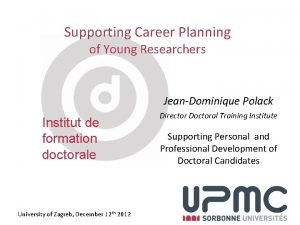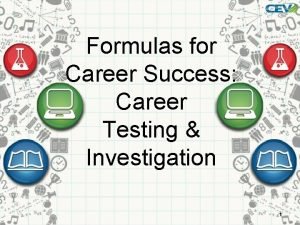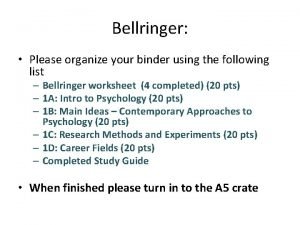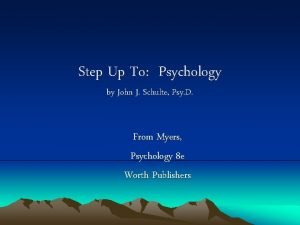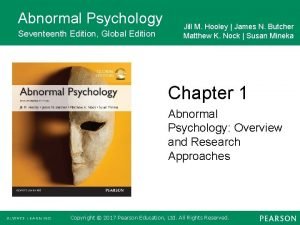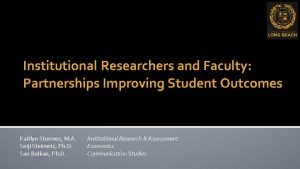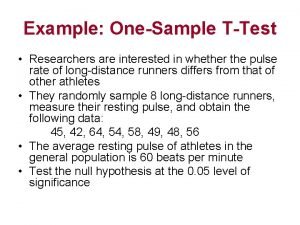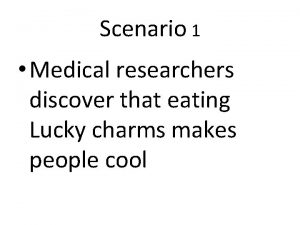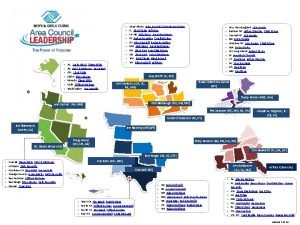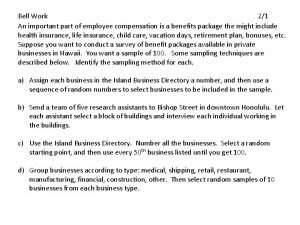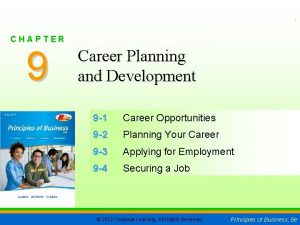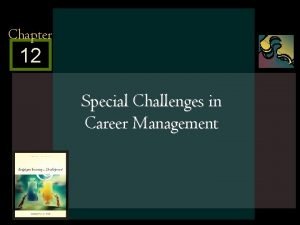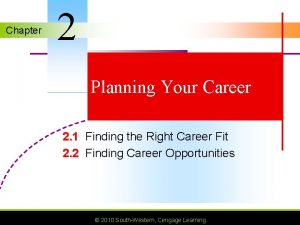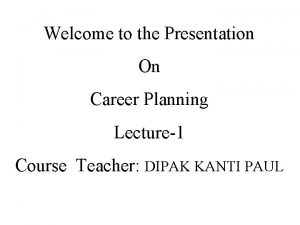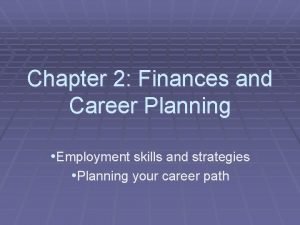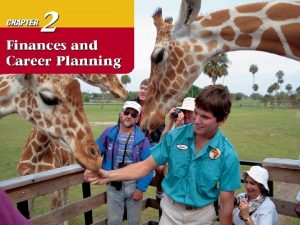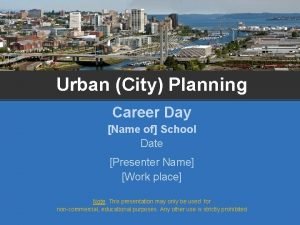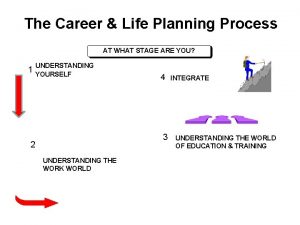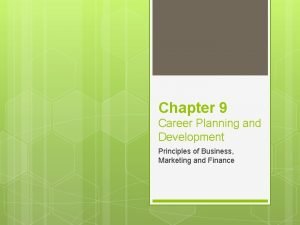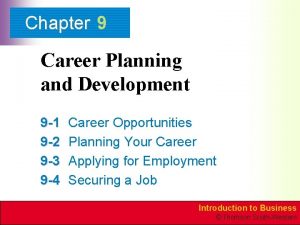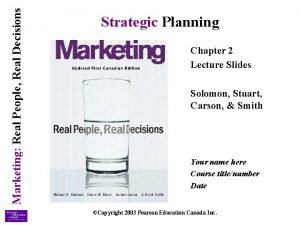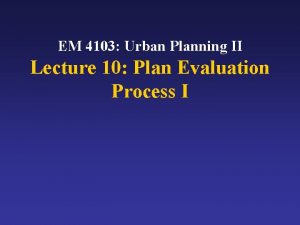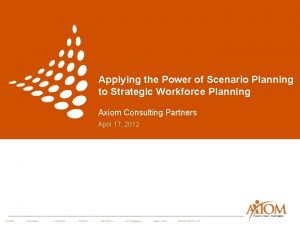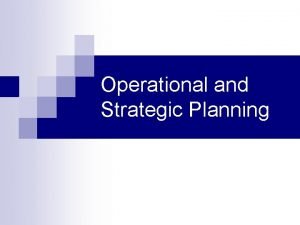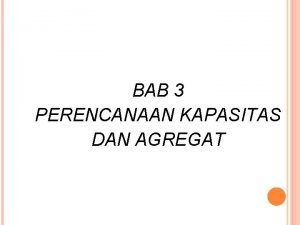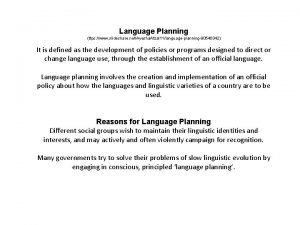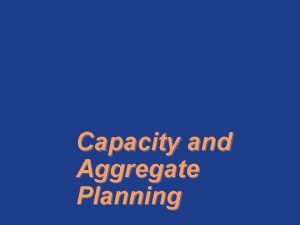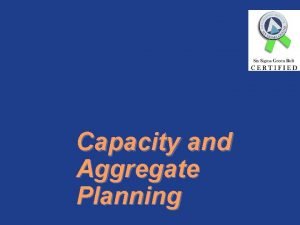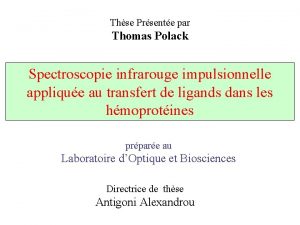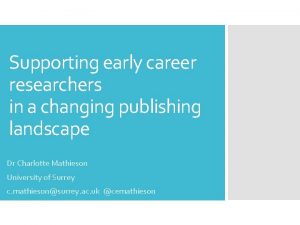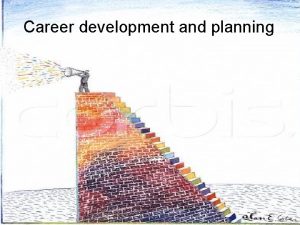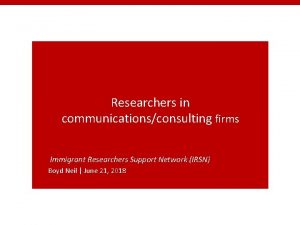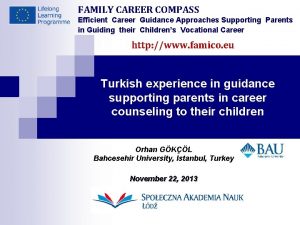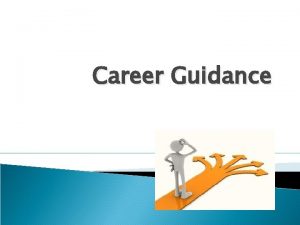Supporting Career Planning of Young Researchers JeanDominique Polack


































- Slides: 34

Supporting Career Planning of Young Researchers Jean-Dominique Polack Institut de formation doctorale University of Zagreb, December 12 th 2012 Director Doctoral Training Institute Supporting Personal and Professional Development of Doctoral Candidates 1

Supporting Career Planning of Young Researchers 1. Pierre and Marie Curie University (UPMC) 2. Employment market • Anticipating professional career plan 3. Training doctoral candidates (DCs) for employment 4. Supporting DCs in career planning 5. The need for strong organisation: • Doctoral Schools 6. Conclusion 2

1. Pierre and Marie Curie University (UPMC) § Sciences & Medicine § 31, 000 students (10, 000 in Medicine – 6, 300 internat. /120 countries) § 10, 800 staff members (5, 900 teachers, researchers, hospitalo-univ) § 475, 000 m 2 / 18 sites (mainly in Paris + 3 marine laboratories) § 400 M€ dedicated to research; 6, 700 scientific publications / year § >600 co-operation & mobility agreements § 120 research units in 4 scientific poles: 1. Modeling & engineering 2. Energy, Matter & Universe 3. Living Earth & Environment 4. Life & Health Sciences 3

Doctorate at UPMC § 3, 400 Doctoral Candidates (DC) registered at UPMC + DC from other universities, in our Doctoral Schools (∑= 4, 400) 1/3 international DC § 19 Doctoral Schools (DS) § 16 DS with UPMC carrying the principal accreditation § 3 DS with co-accreditation § distributed into the 4 research poles of UPMC § 750 Diplomas of Doctorate awarded / year (12 % sci. theses in France) § > 200 co-tutelles 4

Doctorate … … is both: 1. Implementation of a research project Ø advancement of science Ø acquisition of specific, scientific skills Ø acquisition of unique, transferable skills 2. Elaboration of a professional career plan Ø acquisition of large, general skills 5

2. Employment market (UPMC) § § § 98. 6%: Executives and higher intellectual professions: § 72. 5% of doctors are within Public research sector § 59. 0% are researchers or professors § 6. 3% are research or study engineers § 4. 4% are professional health scientists § 2. 8% are high school teachers § 22. 8% are Company executives § 16. 2%: researchers or R & D managers § 4. 8%: engineers or technical managers § 1. 8%: administrative or commercial executives in enterprise § 2. 0%: Civil service executives § 0. 5%: Media professionals § 0. 7%: Independent professionals or related 1. 1%: company heads or assimilated 0. 3%: intermediate occupations 6

Private sector: activity sectors and sizes § § Service macro-sector gathers 49% of doctors working in private sector, Industry gathers 45 % 1/3 of the doctors in private sector work in SMEs (< 250 employees) 7

Factors of job satisfaction § 76% of doctors 'very satisfied' by 1 st job just after Ph. D had anticipated the definition of their professional career plan before the last year of the doctorate § 78% of doctors 'very satisfied' by present job say this job matches very well their career plan at the end of Ph. D 8

Doctors’ job search Length of job search periods § 36% of doctors searching job have done it for more than one year § 'long-term' unemployment rate is less than 1% 45% 40% 39% 35% 30% 23% 25% 20% 17% 19% 15% 10% 5% 2% 0% Less than 6 months 6 to 12 1 to 1. 5 year 1. 5 to 2 months years Looking for job since … 2 to 3 years § Anticipating job search during the Ph. D does "secure” career by avoiding periods of unemployment between successive jobs. Learn more at http: //ifd. upmc. fr/ « Doctors’ job serach » , 6 pages 9

The employers of doctors Nearly 800 different employers were referenced during the investigation § § Each employer is characterized by its business sector and its legal status 10

Professional satisfaction (PS) § Evaluation of job that followed the Ph. D and of current job § Overall satisfaction § « Of your current job, you would say you are: very satisfied / somewhat dissatisfied / very dissatisfied / no answer » § Work-life satisfaction according 5 components § § § Interest for the job Working conditions Work recognition Level of remuneration Job outlook Job just after Ph. D: 89% of satisfied doctors 45% very satisfied doctors Current job: 94% of satisfied doctors 49% very satisfied doctors 11

PS: comparison with other graduates § For each of these aspects of your professional life, indicate whether you are currently satisfied or not Sources: professional status in 2006 of the class of 2004, Dec. 2006, APEC survey Dr. X Wanted 2009 edition NB: for UPMC doctors, the question focuses on job just after Ph. D 12

3. Training DCs for employment § The necessary skills § A comprehensive training offer § Doctors’ skills 13

Generic competences (Budapest descriptors) § § Doctors should be able of: § § § critical analysis, evaluation and synthesis of new and complex ideas; efficient communication about their areas of expertise; developing and applying methodology to the solution of novel problems. Doctors should manage: § § § § § planning process – objectives, strategies, policies, decision making. structure and process of organising – flexibility, adaptability, time management. human resources – team building, formulating motivation strategies. information – analysis, evaluation, synthesis and selection of concepts and facts. communication process development process – internal and external training, handling innovation. management of financial issues –budgetary questions, budget restrictions. process of controlling and assessing quality. social responsibility and ethics. 14

Doctors’ skills 15

Recruiting experienced researcher 16

Recruiting young researcher 17

A comprehensive training offer § Training & Careers Department § Mission: § support doctoral candidates in preparing their professional future § training offer § trimmed to candidate’s Doctoral Research Project § trimmed to candidate’s professional career plan § helps candidate to develop the knowledge and skills needed for Ph. D and future jobs 18

Continuing training offer 1. Scientific expansion (<—> DS) 2. Scientific awareness & social issues 3. Digital environment & languages 4. Understanding organizations & their environments § Research organisations and companies 5. Innovation & exploitation / valorization 6. Communication & management 7. Professional career plan & career management 19

Courses offer § Courses adapted to doctorate level § specialised trainers, internal to university or external consultants § Continuous Education, no “lectures” nor “teaching” § Format or action-type § § half-days or full days: information and meeting with enterprises awareness-raising seminaries (30 participants, or more) deepening workshops (8 -16 participants) individual interviews 20

Individual Training Plan § Individual Training Plan (ITP) prepared at the beginning of Ph. D for the whole duration of Ph. D: § with supervisor § validated by Doctoral School § can evolve along Ph. D § Well-balanced training plan comprises: § scientific expansion and awareness courses § courses on useful methods / techniques / tools for the research project § generic courses on professional practices in view of elaborating a concrete professional career plan § management and communication, § understanding organisations, workplaces, and activity sectors § employment market, etc. 21

4. Supporting DCs in career planning § Monitoring doctoral research project § Training policy § Evaluation grid 22

monitoring Doctoral Research Projects (DRP) § personal interview at registration time § follow-up: § written reports, at mid-term or every year § mid-term defences: § beginning, middle or end of 2 nd year § report sent to Doctoral School (DS) § thesis committee with 2 to 4 participants, 1 ext. to Lab, 1 from DS § report sent to DS § tutor external to lab, with yearly or mid-term meetings § report sent to DS 23

following-up DRPs § professional career plan § § § When talk about it: 1 st or 3 rd year? Thesis committee or mid-term defence Part of tutor’s mission Registration interview DS Day with intervention of former Ph. D candidates § further ideas: § annual individual meeting with one board member 24

training policy § minimum of training needed for defence § between 60 and 120 hours § scientific training: DS § thematic days § thematic schools, summer schools, etc. § professional training: specialised structure § minimum of 30 hours § but … official position is: § no minimum – individual plan (ITP) 25

Evaluation grid § Professional and management skills: § § § lead with enthusiasm spirit of enterprise evaluate one’s work in context (role of writing papers) sincerity – integrity develop one’s skills project management: § § focalisation time and delays cost management manage complexity 26

Evaluation grid § prejudices and opacities § doctoral candidates develop outstanding capacities of analysis and syntheses § be proud to be a doctor § highest university diploma (needs some explanations – sometimes) § valorise the job : – operational and relational levels – speak in public (workshops) § do not hide behind technique, but explain your know-how and your desires 27

5. The need for strong organisation § Doctoral Schools (DS) § Federation of research teams around a given scientific field § Scientific community of dialogue & exchanges § Run by a director assisted by a board to pilot, propose & define the doctoral policy of the DS (within the framework of the doctoral charter & the doctoral policy of the university) § Scientific & pedagogic team to organize the life of the DS

Some roles of Doctoral Schools § Beginning of the Doctorate § Doctoral Researchers Recruitment § Integration of new Doctoral Researchers § During the Doctorate § Life of DS (website, meetings, workshops…) § Follow-up of Doctoral Research Projects (follow-up committees) § Follow-up of the Individual Training Plan of each Doctoral Researcher § Problems and conflicts management § At the end of the Doctorate § Ph. D’s careers tracking

Charter of doctorate § states the doctoral policy of the university § some specific points: • supervision • regular meetings with thesis supervisor • maximum of 2 new Ph. D candidates per supervisor per year • regular follow up by the doctoral school • continuing education and individual training plan (ITP) • ITP is defined at the start of doctoral project • regular up-dates with supervisor and doctoral schools • engagement to follow courses when registered • mediation • 1 st level: doctoral school • 2 nd level: Doctoral Training Institute 30

Conclusion § A doctorate is … § training to & by research – for knowledge & innovation no doctorate without the practice of an original research § experience in research indispensable for the future managers & leaders § a three-year professional experience, essential to § understand the world of research & innovation, § address complex problems, § build new solutions, explore possibilities, … § a professional bridge § to academic or private research § toward all sectors & professions 31

Some skills developed by doctors • critical analysis and synthesis of complex ideas • define new problems, find innovative and adapted solutions • imagine and develop strategies and concepts • open new paths • push the limits of knowledge • work in team, yet be autonomous • manage a project, communicate • manage failure, bounce again, and advance 32

Salzburg II (2010) A doctorate is based on: § research (learning through practice of original research project) § building of a critical mass of research § development of creativity, personal and professional skills (careers) § recruitment of DC (open, transparent and fair procedures) § development of a large, global training offer ( � skills) § prove the added-value (Quality, evaluation, indicators) § DC are young professionals – "early-stage researchers" (financing) 33

Thank you for your attention … questions ? ? ? Institut de formation doctorale
 Jean-dominique polack
Jean-dominique polack Fcs lanchpad
Fcs lanchpad Formulas for career success
Formulas for career success Researchers who are studying a new shampoo
Researchers who are studying a new shampoo What is the cardinal rule of naturalistic observation
What is the cardinal rule of naturalistic observation 5 year old tammy mistakenly believes
5 year old tammy mistakenly believes Analogue studies are used when researchers ____.
Analogue studies are used when researchers ____. Researchers
Researchers Researchers are interested in whether or not
Researchers are interested in whether or not Medical researchers discover that eating lucky charms
Medical researchers discover that eating lucky charms Patrick scrick
Patrick scrick Medical researchers followed 6272 swedish
Medical researchers followed 6272 swedish Une key dates
Une key dates Chapter 9 career planning and development
Chapter 9 career planning and development Special challenges in career management
Special challenges in career management Sodi career planning model
Sodi career planning model American trans air careers
American trans air careers A(n) is a desired end toward which efforts are directed.
A(n) is a desired end toward which efforts are directed. Career planning presentation
Career planning presentation Chapter 2 finances and career planning
Chapter 2 finances and career planning Chapter 4 finances and career planning
Chapter 4 finances and career planning Chapter 11 finances and career planning
Chapter 11 finances and career planning City planning career
City planning career Career life planning
Career life planning Chapter 9 career planning and development
Chapter 9 career planning and development Chapter 9 career planning and development
Chapter 9 career planning and development Strategic planning vs tactical planning
Strategic planning vs tactical planning Planning balance sheet in urban planning
Planning balance sheet in urban planning Role segmentation workforce planning
Role segmentation workforce planning Proactive planning and reactive planning
Proactive planning and reactive planning Perencanaan kapasitas dan agregat
Perencanaan kapasitas dan agregat Long term plan and short term plan
Long term plan and short term plan Language planning ppt
Language planning ppt List the strategic objectives of aggregate planning
List the strategic objectives of aggregate planning Aggregate planning is capacity planning for
Aggregate planning is capacity planning for
